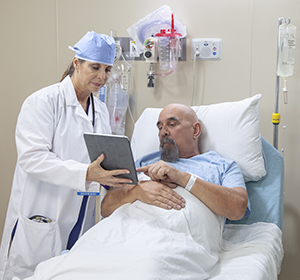After a hip fracture occurs, you will likely be taken to a hospital emergency room (ER). While in the ER, many tests will be done, including X-rays and blood tests. The nursing staff will monitor your blood pressure, heart rate, and breathing. You will be given pain medicine. If you are alone, a staff member will try to contact your family or a friend so they can be with you.
What happens next?
Your surgery, if needed, will be done once a surgical team can be readied. This often takes less than
Your healthcare team
A team of healthcare providers will be with you during your hospital stay.
-
Orthopedic surgeons repair the hip and guide your treatment.
-
Physician assistants (PAs) and nurse practitioners (NPs) assist in surgery and provide care.
-
Nurses provide daily care and help you manage pain.
-
Physical therapists (PTs) teach you exercises that build strength and aid recovery. They will also teach you how to get around safely while you heal.
-
Occupational therapists (OTs) teach you how to do daily activities. This helps prepare you to go home.
-
Case managers or social workers help prepare insurance and discharge paperwork.
Possible risks
Any surgery has risks. The possible risks and complications of this surgery include:
-
Infection
-
Dislocation of the joint
-
Blood clots
-
The fracture does not heal
-
Reaction to the anesthesia
-
Pneumonia
-
Damage to nearby blood vessels, bones, or nerves
-
Fat tissue passes into the blood and blocks a blood vessel (fat embolism)
-
Walking with a limp
-
Pain
-
One leg shorter than the other (leg length discrepancy)
Featured in


